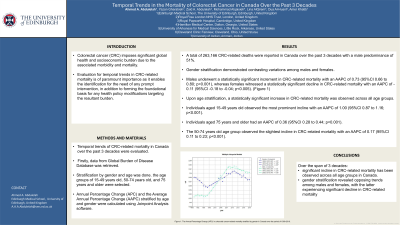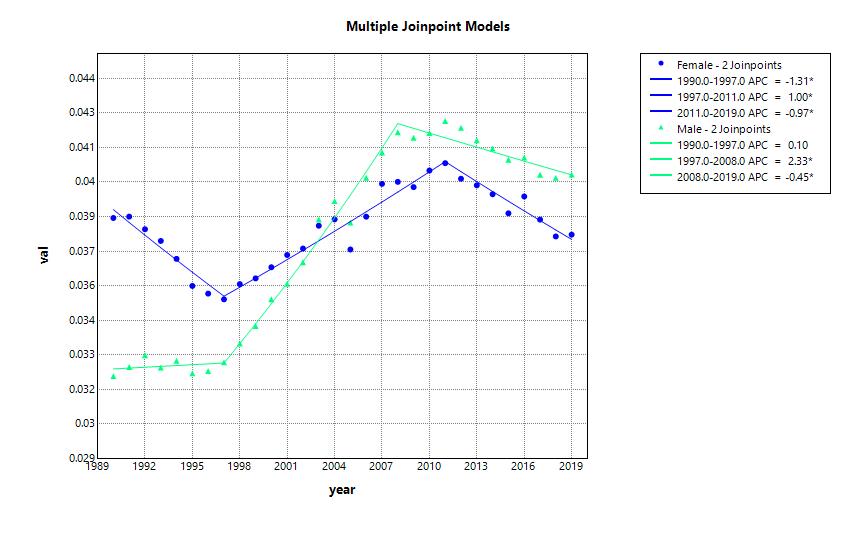Monday Poster Session
Category: Colon
P1923 - Temporal Trends in the Mortality of Colorectal Cancer in Canada Over the Past 3 Decades
Monday, October 28, 2024
10:30 AM - 4:00 PM ET
Location: Exhibit Hall E

Has Audio

Ahmed A. A. Abdulelah, MD
University of Edinburgh
Edinburgh, Scotland, United Kingdom
Presenting Author(s)
Ahmed A. Abdulelah, MD1, Yazan Gharaibeh, MD2, Zaid A. Abdulelah, MD3, Mohammad Alqaisieh, MD4, Lina AlQirem, MD5, Dua' Al-Husni, MD6, Amer Khatib, MD7
1University of Edinburgh, Edinburgh, Scotland, United Kingdom; 2Royal Free London NHS Trust, London, England, United Kingdom; 3Royal Papworth Hospital, Cambridge, England, United Kingdom; 4Hamilton Medical Center, Dalton, GA; 5University of Arkansas for Medical Sciences, Little Rock, AR; 6Cleveland Clinic Foundation, Cleveland, OH; 7University of Jordan, Amman, 'Amman, Jordan
Introduction: Colorectal cancer (CRC) imposes significant global health and socioeconomic burden due to the associated morbidity and mortality. Evaluation for temporal trends in CRC-related mortality is of paramount importance as it enables the identification for the need of any prompt intervention, in addition to forming the foundational basis for any health policy modifications targeting the resultant burden.
Methods: The temporal trends of CRC-related mortality in Canada over the past 3 decades have been evaluated by retrieving the relevant data from the Global Burden of Diseases 2019 database. Subsequently, Joinpoint Regression Analysis software was utilized to calculate the Annual Percentage Change (APC) and the Average Annual Percentage Change (AAPC), stratified by gender and age.
Results: A total of 263,166 CRC-related deaths were reported in Canada over the past 3 decades with a male predominance of 51%. Gender stratification demonstrated contrasting variations among males and females. Males underwent a statistically significant increment in CRC-related mortality with an AAPC of 0.73 (95%CI 0.66 to 0.80; p< 0.001), whereas females witnessed a statistically significant decline in CRC-related mortality with an AAPC of -0.11 (95%CI -0.18 to -0.04; p< 0.005) (Figure 1). Upon age stratification, a statistically significant increase in CRC-related mortality was observed across all age groups. Notably, individuals aged 15-49 years old observed the most prominent incline with an AAPC of 1.00 (95%CI 0.87 to 1.16; p< 0.001), followed by individuals aged 75 years and older who had an AAPC of 0.36 (95%CI 0.28 to 0.44; p< 0.001). The 50-74 years old age group observed the slightest incline in CRC-related mortality with an AAPC of 0.17 (95%CI 0.11 to 0.23; p< 0.001).
Discussion: Over the span of 3 decades, significant incline in CRC-related mortality has been observed across all age groups in Canada. However, gender stratification revealed opposing trends among males and females, with the latter experiencing significant decline in CRC-related mortality. Nonetheless, prompt measures, both at therapeutic and preventative level, are mandated to effectively tackle the increase in CRC-related mortality.

Disclosures:
Ahmed A. Abdulelah, MD1, Yazan Gharaibeh, MD2, Zaid A. Abdulelah, MD3, Mohammad Alqaisieh, MD4, Lina AlQirem, MD5, Dua' Al-Husni, MD6, Amer Khatib, MD7. P1923 - Temporal Trends in the Mortality of Colorectal Cancer in Canada Over the Past 3 Decades, ACG 2024 Annual Scientific Meeting Abstracts. Philadelphia, PA: American College of Gastroenterology.
1University of Edinburgh, Edinburgh, Scotland, United Kingdom; 2Royal Free London NHS Trust, London, England, United Kingdom; 3Royal Papworth Hospital, Cambridge, England, United Kingdom; 4Hamilton Medical Center, Dalton, GA; 5University of Arkansas for Medical Sciences, Little Rock, AR; 6Cleveland Clinic Foundation, Cleveland, OH; 7University of Jordan, Amman, 'Amman, Jordan
Introduction: Colorectal cancer (CRC) imposes significant global health and socioeconomic burden due to the associated morbidity and mortality. Evaluation for temporal trends in CRC-related mortality is of paramount importance as it enables the identification for the need of any prompt intervention, in addition to forming the foundational basis for any health policy modifications targeting the resultant burden.
Methods: The temporal trends of CRC-related mortality in Canada over the past 3 decades have been evaluated by retrieving the relevant data from the Global Burden of Diseases 2019 database. Subsequently, Joinpoint Regression Analysis software was utilized to calculate the Annual Percentage Change (APC) and the Average Annual Percentage Change (AAPC), stratified by gender and age.
Results: A total of 263,166 CRC-related deaths were reported in Canada over the past 3 decades with a male predominance of 51%. Gender stratification demonstrated contrasting variations among males and females. Males underwent a statistically significant increment in CRC-related mortality with an AAPC of 0.73 (95%CI 0.66 to 0.80; p< 0.001), whereas females witnessed a statistically significant decline in CRC-related mortality with an AAPC of -0.11 (95%CI -0.18 to -0.04; p< 0.005) (Figure 1). Upon age stratification, a statistically significant increase in CRC-related mortality was observed across all age groups. Notably, individuals aged 15-49 years old observed the most prominent incline with an AAPC of 1.00 (95%CI 0.87 to 1.16; p< 0.001), followed by individuals aged 75 years and older who had an AAPC of 0.36 (95%CI 0.28 to 0.44; p< 0.001). The 50-74 years old age group observed the slightest incline in CRC-related mortality with an AAPC of 0.17 (95%CI 0.11 to 0.23; p< 0.001).
Discussion: Over the span of 3 decades, significant incline in CRC-related mortality has been observed across all age groups in Canada. However, gender stratification revealed opposing trends among males and females, with the latter experiencing significant decline in CRC-related mortality. Nonetheless, prompt measures, both at therapeutic and preventative level, are mandated to effectively tackle the increase in CRC-related mortality.

Figure: The Annual Percentage Change (APC) in colorectal cancer-related mortality stratified by gender in Canada over the period of 1990-2019.
Disclosures:
Ahmed Abdulelah indicated no relevant financial relationships.
Yazan Gharaibeh indicated no relevant financial relationships.
Zaid Abdulelah indicated no relevant financial relationships.
Mohammad Alqaisieh indicated no relevant financial relationships.
Lina AlQirem indicated no relevant financial relationships.
Dua' Al-Husni indicated no relevant financial relationships.
Amer Khatib indicated no relevant financial relationships.
Ahmed A. Abdulelah, MD1, Yazan Gharaibeh, MD2, Zaid A. Abdulelah, MD3, Mohammad Alqaisieh, MD4, Lina AlQirem, MD5, Dua' Al-Husni, MD6, Amer Khatib, MD7. P1923 - Temporal Trends in the Mortality of Colorectal Cancer in Canada Over the Past 3 Decades, ACG 2024 Annual Scientific Meeting Abstracts. Philadelphia, PA: American College of Gastroenterology.
